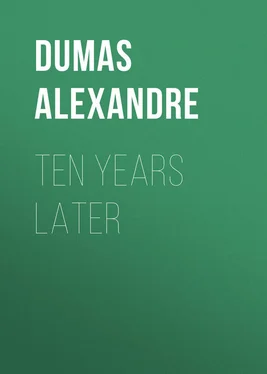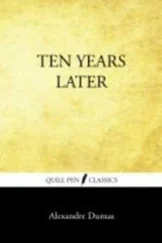Alexandre Dumas - Ten Years Later
Здесь есть возможность читать онлайн «Alexandre Dumas - Ten Years Later» — ознакомительный отрывок электронной книги совершенно бесплатно, а после прочтения отрывка купить полную версию. В некоторых случаях можно слушать аудио, скачать через торрент в формате fb2 и присутствует краткое содержание. Жанр: literature_19, foreign_antique, foreign_prose, на английском языке. Описание произведения, (предисловие) а так же отзывы посетителей доступны на портале библиотеки ЛибКат.
- Название:Ten Years Later
- Автор:
- Жанр:
- Год:неизвестен
- ISBN:нет данных
- Рейтинг книги:4 / 5. Голосов: 1
-
Избранное:Добавить в избранное
- Отзывы:
-
Ваша оценка:
- 80
- 1
- 2
- 3
- 4
- 5
Ten Years Later: краткое содержание, описание и аннотация
Предлагаем к чтению аннотацию, описание, краткое содержание или предисловие (зависит от того, что написал сам автор книги «Ten Years Later»). Если вы не нашли необходимую информацию о книге — напишите в комментариях, мы постараемся отыскать её.
Ten Years Later — читать онлайн ознакомительный отрывок
Ниже представлен текст книги, разбитый по страницам. Система сохранения места последней прочитанной страницы, позволяет с удобством читать онлайн бесплатно книгу «Ten Years Later», без необходимости каждый раз заново искать на чём Вы остановились. Поставьте закладку, и сможете в любой момент перейти на страницу, на которой закончили чтение.
Интервал:
Закладка:
Raoul stopped, bit his lips, and then, with the blood mantling in his face, he said, courageously, – “One word of explanation, I beg, monsieur. You cannot forget that your son is a man.”
“In that case,” replied Athos, drawing himself up with sternness, “prove to me that you are a man, for you do not show yourself a son. I begged you to wait the opportunity of forming an illustrious alliance. I would have obtained a wife for you from the first ranks of the rich nobility. I wish you to be distinguished by the splendor which glory and fortune confer, for nobility of descent you have already.”
“Monsieur,” exclaimed Raoul, carried away by a first impulse. “I was reproached the other day for not knowing who my mother was.”
Athos turned pale; then, knitting his brows like the greatest of all the heathen deities: – “I am waiting to learn the reply you made,” he demanded, in an imperious manner.
“Forgive me! oh, forgive me,” murmured the young man, sinking at once from the lofty tone he had assumed.
“What was your reply, monsieur?” inquired the count, stamping his feet upon the ground.
“Monsieur, my sword was in my hand immediately, my adversary placed himself on guard, I struck his sword over the palisade, and threw him after it.”
“Why did you suffer him to live?”
“The king has prohibited duelling, and, at the moment, I was an ambassador of the king.”
“Very well,” said Athos, “but all the greater reason I should see his majesty.”
“What do you intend to ask him?”
“Authority to draw my sword against the man who has inflicted this injury upon me.”
“If I did not act as I ought to have done, I beg you to forgive me.”
“Did I reproach you, Raoul?”
“Still, the permission you are going to ask from the king?”
“I will implore his majesty to sign your marriage-contract, but on one condition.”
“Are conditions necessary with me, monsieur? Command, and you shall be obeyed.”
“On the condition, I repeat,” continued Athos; “that you tell me the name of the man who spoke of your mother in that way.”
“What need is there that you should know his name; the offense was directed against myself, and the permission once obtained from his majesty, to revenge it is my affair.”
“Tell me his name, monsieur.”
“I will not allow you to expose yourself.”
“Do you take me for a Don Diego? His name, I say.”
“You insist upon it?”
“I demand it.”
“The Vicomte de Wardes.”
“Very well,” said Athos, tranquilly, “I know him. But our horses are ready, I see; and, instead of delaying our departure for a couple of hours, we will set off at once. Come, monsieur.”
Chapter XVI. Monsieur Becomes Jealous of the Duke of Buckingham
While the Comte de la Fere was proceeding on his way to Pairs, accompanied by Raoul, the Palais Royal was the theatre wherein a scene of what Moliere would have called excellent comedy, was being performed. Four days had elapsed since his marriage, and Monsieur, having breakfasted very hurriedly, passed into his ante-chamber, frowning and out of temper. The repast had not been over-agreeable. Madame had had breakfast served in her own apartment, and Monsieur had breakfasted almost alone; the Chevalier de Lorraine and Manicamp were the only persons present at the meal, which lasted three-quarters of an hour without a single syllable having been uttered. Manicamp, who was less intimate with his royal highness than the Chevalier de Lorraine, vainly endeavored to detect, from the expression of the prince’s face, what had made him so ill-humored. The Chevalier de Lorraine, who had no occasion to speculate about anything, inasmuch as he knew all, ate his breakfast with that extraordinary appetite which the troubles of one’s friends but stimulates, and enjoyed at the same time both Monsieur’s ill-humor and the vexation of Manicamp. He seemed delighted, while he went on eating, to detain a prince, who was very impatient to move, still at table. Monsieur at times repented the ascendency which he had permitted the Chevalier de Lorraine to acquire over him, and which exempted the latter from any observance of etiquette towards him. Monsieur was now in one of those moods, but he dreaded as much as he liked the chevalier, and contented himself with nursing his anger without betraying it. Every now and then Monsieur raised his eyes to the ceiling, then lowered them towards the slices of pate which the chevalier was attacking, and finally, not caring to betray the resentment, he gesticulated in a manner which Harlequin might have envied. At last, however, Monsieur could control himself no longer, and at the dessert, rising from the table in excessive wrath, as we have related, he left the Chevalier de Lorraine to finish his breakfast as he pleased. Seeing Monsieur rise from the table, Manicamp, napkin in hand, rose also. Monsieur ran rather than walked, towards the ante-chamber, where, noticing an usher in attendance, he gave him some directions in a low tone of voice. Then, turning back again, but avoiding passing through the breakfast apartment, he crossed several rooms, with the intention of seeking the queen-mother in her oratory, where she usually remained.
It was about ten o’clock in the morning. Anne of Austria was engaged in writing as Monsieur entered. The queen-mother was extremely attached to her son, for he was handsome in person and amiable in disposition. He was, in fact, more affectionate, and it might be, more effeminate than the king. He pleased his mother by those trifling sympathizing attentions all women are glad to receive. Anne of Austria, who would have been rejoiced to have had a daughter, almost found in this, her favorite son, the attentions, solicitude, and playful manners of a child of twelve years of age. All the time he passed with his mother he employed in admiring her arms, in giving his opinion upon her cosmetics, and recipes for compounding essences, in which she was very particular; and then, too, he kissed her hands and cheeks in the most childlike and endearing manner, and had always some sweetmeats to offer her, or some new style of dress to recommend. Anne of Austria loved the king, or rather the regal power in her eldest son; Louis XIV. represented legitimacy by right divine. With the king, her character was that of the queen-mother, with Philip she was simply the mother. The latter knew that, of all places, a mother’s heart is the most compassionate and surest. When quite a child he always fled there for refuge when he and his brother quarreled, often, after having struck him, which constituted the crime of high treason on his part, after certain engagements with hands and nails, in which the king and his rebellious subject indulged in their night-dresses respecting the right to a disputed bed, having their servant Laporte as umpire, – Philip, conqueror, but terrified at victory, used to flee to his mother to obtain reinforcements from her, or at least the assurance of forgiveness, which Louis XIV. granted with difficulty, and after an interval. Anne, from this habit of peaceable intervention, succeeded in arranging the disputes of her sons, and in sharing, at the same time, all their secrets. The king, somewhat jealous of that maternal solicitude which was bestowed particularly on his brother, felt disposed to show towards Anne of Austria more submission and attachment than his character really dictated. Anne of Austria had adopted this line of conduct especially towards the young queen. In this manner she ruled with almost despotic sway over the royal household, and she was already preparing her batteries to govern with the same absolute authority the household of her second son. Anne experienced almost a feeling of pride whenever she saw any one enter her apartment with woe-begone looks, pale cheeks, or red eyes, gathering from appearances that assistance was required either by the weakest or the most rebellious. She was writing, we have said, when Monsieur entered her oratory, not with red eyes or pale cheeks, but restless, out of temper, and annoyed. With an absent air he kissed his mother’s hands, and sat himself down before receiving her permission to do so. Considering the strict rules of etiquette established at the court of Anne of Austria, this forgetfulness of customary civilities was a sign of preoccupation, especially on Philip’s part, who, of his own accord, observed a respect towards her of a somewhat exaggerated character. If, therefore, he so notoriously failed in this regard, there must be a serious cause for it.
Читать дальшеИнтервал:
Закладка:
Похожие книги на «Ten Years Later»
Представляем Вашему вниманию похожие книги на «Ten Years Later» списком для выбора. Мы отобрали схожую по названию и смыслу литературу в надежде предоставить читателям больше вариантов отыскать новые, интересные, ещё непрочитанные произведения.
Обсуждение, отзывы о книге «Ten Years Later» и просто собственные мнения читателей. Оставьте ваши комментарии, напишите, что Вы думаете о произведении, его смысле или главных героях. Укажите что конкретно понравилось, а что нет, и почему Вы так считаете.












